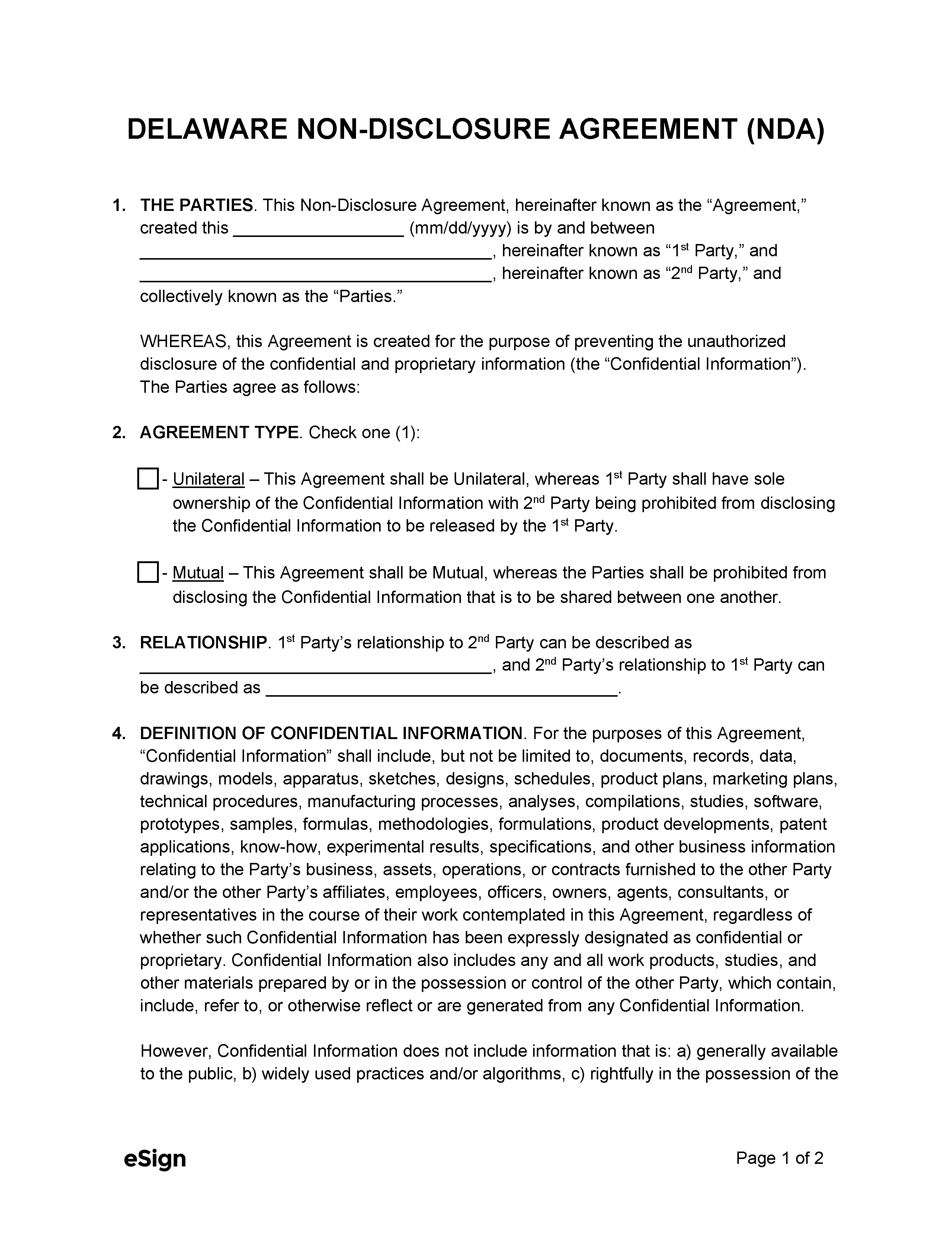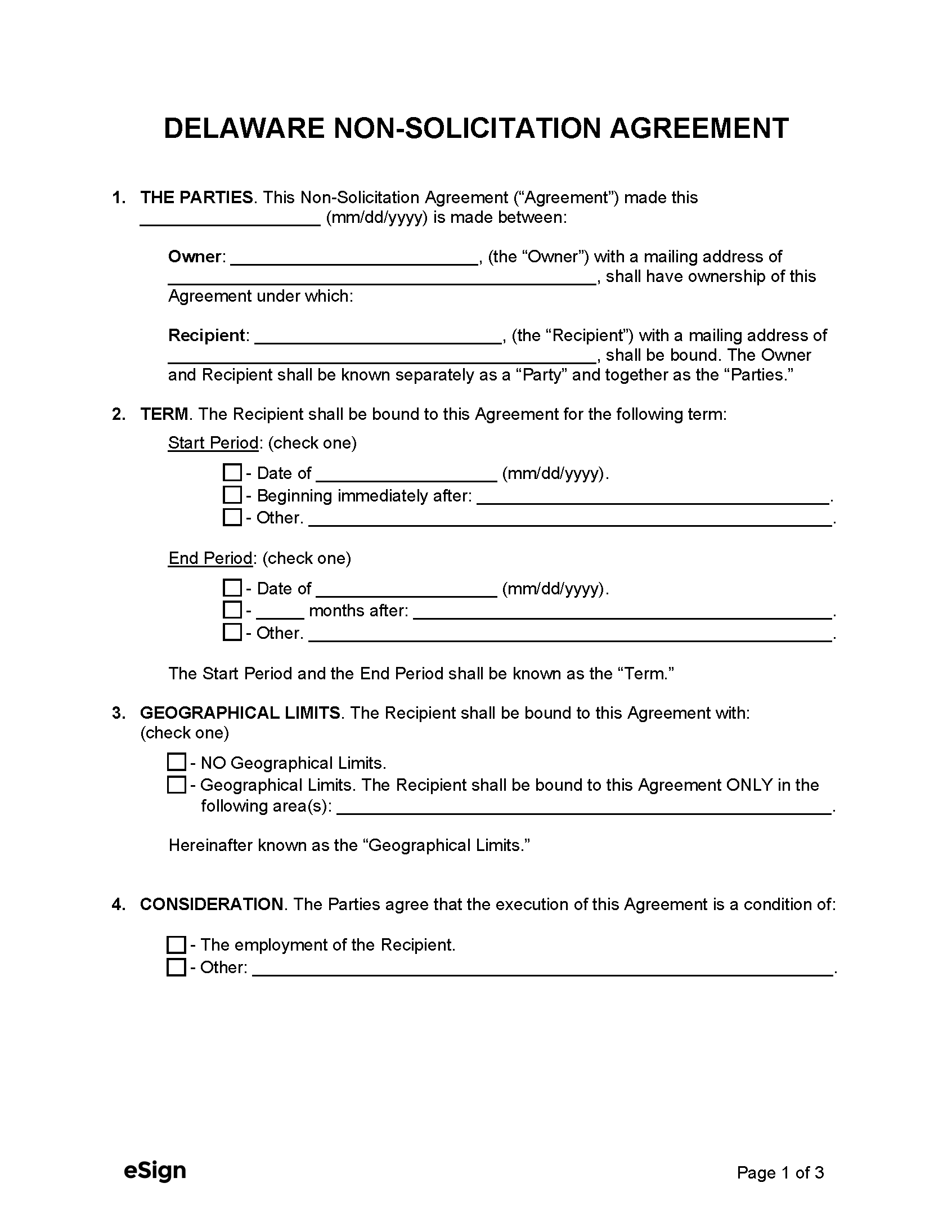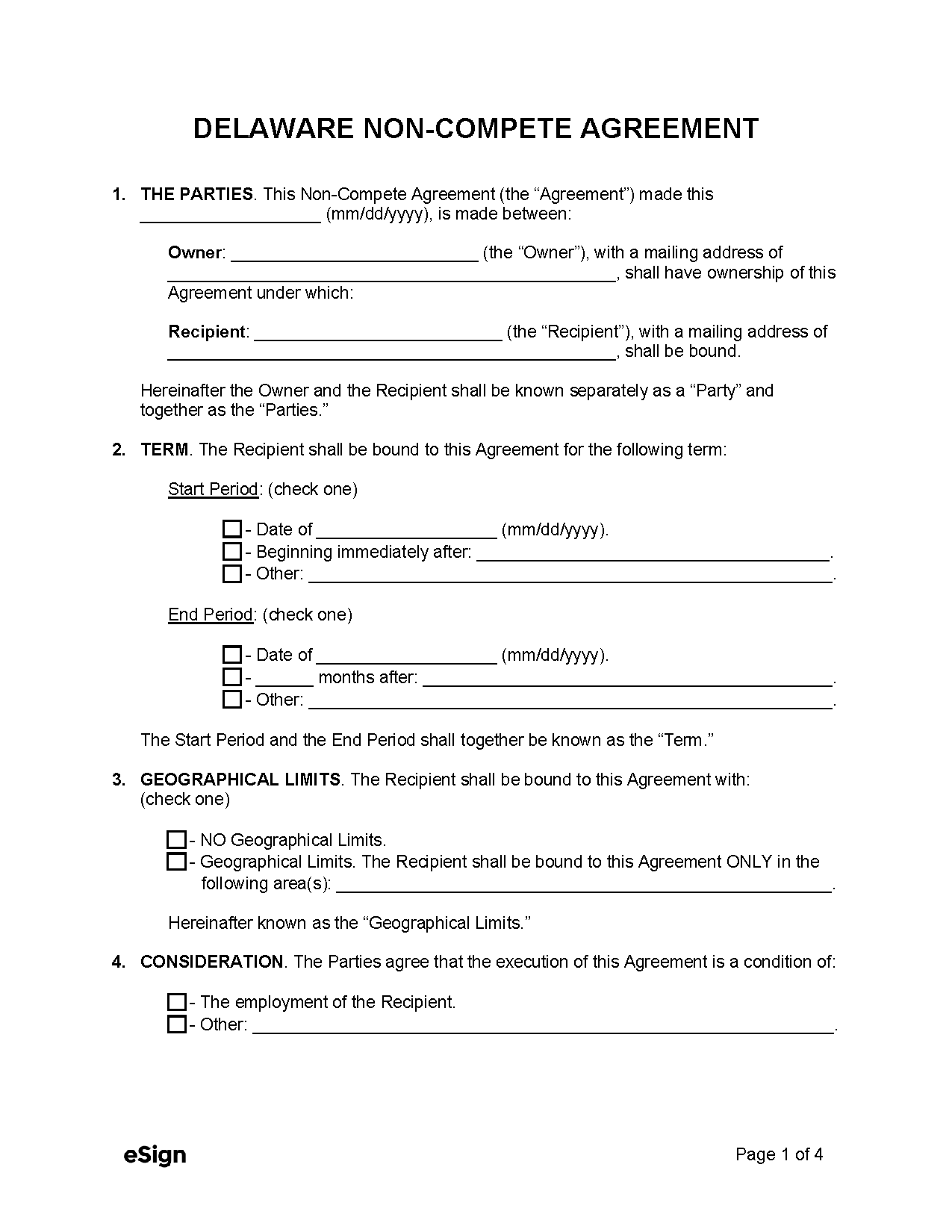A non-compete agreement’s geographic scope and time frame, as well as specific activities the restricted party must refrain from carrying out. In order to ensure a non-compete agreement is upheld by the court, the terms should be reasonable and limited to protecting the owner’s “goodwill” or confidential information.
Contents |
Enforceability in Delaware
In Delaware, non-compete agreements are enforceable, but they are not governed by state statutes.[1] Instead, courts rely on common law to ascertain an agreement’s validity. In order for an agreement to be upheld, the restrictions must:
- Comply with common law contract requirements.
- Set reasonable geographic and time constraints.
- Defend a legitimate financial interest (e.g., client base, trade secrets, region of operations, etc.)
- Protect the employer from a financial loss greater than the hardship imposed on the employee (“survive a balance of equities”).[2]
When it IS Enforceable
- Workplace. Non-compete agreements may be enforced against an employee to protect the employer’s goodwill or sensitive information.[3]
- Selling a company. Non-compete covenants are regularly used in purchase contracts for businesses and are enforced provided they adhere to common law requirements.[4]
When it’s NOT Enforceable
- Attorneys. A non-compete clause or other restrictive covenant may not limit an attorney’s ability to practice law or represent clients. Restrictive covenants, however, are valid in agreements about an attorney’s retirement benefits.[5]
- Physicians. A non-compete covenant may not be enforced against a physician.[1]
Maximum Time Period
As Delaware statutes do not provide laws for regulating non-compete agreements, the courts rely on previous cases and their judgment to evaluate the reasonableness of a non-compete’s time restrictions, taking into account:
- The position held by the employee;
- The employer’s financial interest; and
- The area covered by the agreement.[6][7]
Non-compete agreements with a time restriction of one (1) to two (2) years are deemed reasonable for skilled workers and those in management, and courts have upheld agreements with durations of up to 3 years.[8][9]
Geographical Area
Delaware courts consider a geographic scope reasonable if it is limited to where the employer has a protectable interest. The courts will uphold restrictions that meet this condition, even if the range is significant. In one case where the business operated on a national level, the courts enforced a covenant not to compete prohibiting a former company owner from competing anywhere in the U.S.[10]
Consideration
A non-compete agreement must include consideration to be valid.[8]
In the past, the courts have deemed the following as appropriate consideration:
- A job offer[2]
- Going from a probationary position to a permanent one[11]
- Continuation of an at-will worker’s employment[2]
- Financial compensation[10]
- Restricted stock units (RSU)[12]
Sources
- 6 Del. C. § 2707
- All Pro Maids, Inc. v. Layton, Civil Action No. 058-N, 2004 WL 1878784 (Del. Ch. Aug. 9, 2004)
- Elite Cleaning Co. v. Capel, No. CIV.A. 690-N, 2006 WL 1565161, at *4 (Del. Ch. June 2, 2006)
- Tristate Courier & Carriage, Inc. v. Berryman, No. C.A. 20574-NC, 2004 WL 835886, at *10 (Del. Ch. Apr. 15, 2004)
- Rule 5.6 of the Delaware Rules of Professional Conduct
- Delaware Express Shuttle, Inc. v. Older, No. CIV.A. 19596-NC, 2003 WL 1903577, at *14 (Del. Ch. Apr. 9, 2003)
- Singh v. Batta Env’t Assocs., Inc., No. CIV.A. 19627, 2003 WL 21309115, at *7-8 (Del. Ch. May 21, 2003)
- Faw, Casson & Co., v. Cranston, 375 A.2d 463 (Del. Ch. 1977)
- Weichert Co. of Pennsylvania v. Young, No. CIV.A. 2223-VCL, 2007 WL 4372823, at *3 (Del. Ch. Dec. 7, 2007)
- O’Leary v. Telecom Res. Serv., LLC, No. 10C-03-108-JOH, 2011 WL 379300, at *5 (Del. Super. Ct. Jan. 14, 2011)
- RHIS, Inc. v. Boyce, No. CIV. A. 18924, 2001 WL 1192203, at *4 (Del. Ch. Sept. 26, 2001)
- Newell Rubbermaid Inc. v. Storm, No. CV 9398-VCN, 2014 WL 1266827, at *9 (Del. Ch. Mar. 27, 2014)
- WebMD Health Corp. v. Dale, No. CIV.A. 11-5827, 2012 WL 3263582, at *9 (E.D. Pa. Aug. 10, 2012)
- KNOWLES-ZESWITZ MUSIC, INC. v. CARA, 260 A.2d 171 (Del. Ch. 1969)
- Delaware Elevator, Inc. v. Williams, No. CIV.A. 5596-VCL, 2011 WL 1005181, at *11 (Del. Ch. Mar. 16, 2011)
Related Forms (2)

Download: PDF, Word (.docx), OpenDocument

Download: PDF, Word (.docx), OpenDocument
